Inside Sunderland's medical cannabis boom
Six years ago, medical cannabis became legal in the UK. The drug, which has to be prescribed by specialist doctors, is used to treat conditions including OCD and chronic pain. While the NHS says more "evidence" is needed for a wider rollout, the industry is said to be booming.
Tucked away on an industrial estate by the River Wear is the UK's largest medical cannabis processing site. Six years ago, 42 people worked here in Sunderland. The workforce now stands at about 200 - and it's growing.
Inside the lab, the smell becomes apparent.
"When you first tell friends and family that you work with cannabis you get jokes like, 'Do you get any free samples?' But, on the whole, people are dead interested," explains Tabitha Bonallie, 26, who is tasked with health and safety.
"When I first started four years ago this lab had only just opened and now, even in the relatively short space of time that I've been here, the growth has just been crazy."
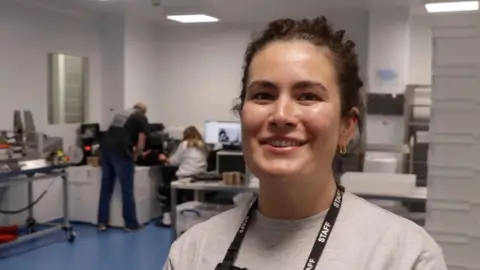
There are more than 30 clinics currently prescribing medical cannabis in the UK.
It has to be prescribed by specialist doctors for certain conditions and private clinics say they are seeing a growing number of clients.
The end product, for the majority of those who use it, is dried cannabis flower that can be vaped.
Others opt for different means of consumption, including edible THC 'sweets' - THC is the main psychoactive compound of the cannabis plant.
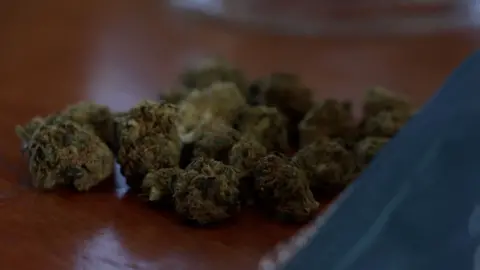
Medical cannabis became legal in the UK in November 2018 after a campaign to make it available to children with severe epilepsy.
The drug has only been prescribed to a handful of people on the NHS.
The Department of Health and Social Care said licensed cannabis-based medicines are routinely funded where there is "clear evidence of their quality, safety, and effectiveness".
They added: "The NHS is taking an evidence-based approach to unlicensed cannabis-based treatments to ensure they are proved safe and effective before they can be considered for rollout more widely."
Smell 'overwhelming'
The production line begins more than 1,000 miles (1,609km) away in Lisbon, Portugal.
In a secured facility, seven greenhouses spanning 20,000 sq m hold about 7,500 cannabis plants each, with each crop having an estimated market value of $4m (£3.12m).
It is hot and even from the outside the smell of cannabis is overwhelming.
General manager Nuno Mendoca says the good weather is utilised for the plants, but even then, industrial LEDs must be used to ensure consistency of the crop.
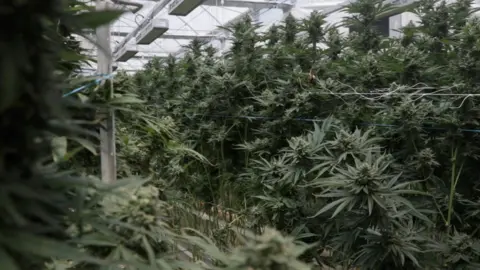
Dozens of workers begin cutting the mature plants, packing them into boxes before wheeling them into another room, where a team uses clippers to remove the stems.
The flower is put through various machines and the process is long and complicated.
"This is treated like a regular pharmaceutical product in order for it to be released to the market," Nuno explains.
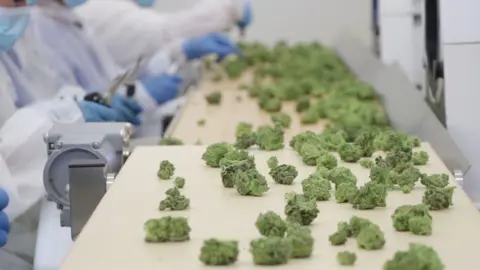
Back in Sunderland, the production lines rumble away as the end product is packaged up, ready to be sent to clients.
The company, Curaleaf UK, says its exports of medical cannabis trebled in the last year, with 200kg (441lb) now arriving at the site each month.
One in 25 of its 16,000 clients live in the region, with chronic pain being the most common reason for prescription.
Jonathan Hodgson, managing director, says the industry's growth is expected to continue.
"It's sometimes difficult to get the total picture in a new industry but most people agree it's growing every month," he says.
"All we know for a fact is what we're producing - and we deliver cannabis to other clinics as well.
"It grows by hundreds and hundreds every month."
Other businesses have previously told the BBC they have seen growth.
Mamedica, a medical cannabis clinic based in London, said it had seen the number of clients increase by more than 10 times in 2023, rising from 250 to 2,750.
'People will have opinions'
Denise Clark, originally from Portland, Oregon, but who now lives in Ulverston, Cumbria, uses medical cannabis.
The 46-year-old, who suffers from chronic pain, says she spent "five or six years" being told by doctors her pain levels could not be treated.
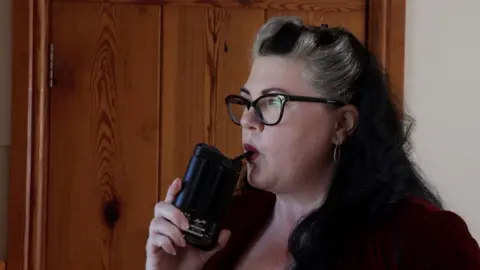
"I was surprised at how great it was at managing pain and it felt like that was some sort of secret, like why don't more people know about this?
"People will have opinions, but if we keep quiet and don't tell people, then there are people suffering when they don't need to".
In the UK, cannabis is an illegal Class B drug. The maximum penalty for possession is up to five years in prison, an unlimited fine or both.
Benn Goodings, from Sunderland, previously self-medicated with illicit cannabis.
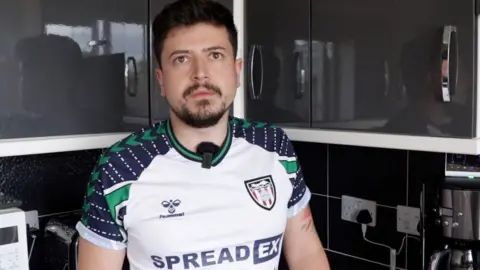
The 28-year-old says he now uses medical cannabis to help with his depression and anxiety, something he has suffered from since he was a teenager.
"Sometimes my mind is racing and this brings me to a normal level," he says.
He believes the use of medical cannabis was "demonised a lot, for the wrong reasons".
"Now, I'm just a normal guy taking his meds."
'Not a cure-all drug'
Prof Mike Barnes, a consultant neurologist and an expert in medical cannabis, believes the evidence around its benefits is "overwhelming", but scepticism and stigma do exist.
"It's not a cure-all drug, it's not a miracle drug, but it's a remarkably useful drug for a lot of problems," he says.
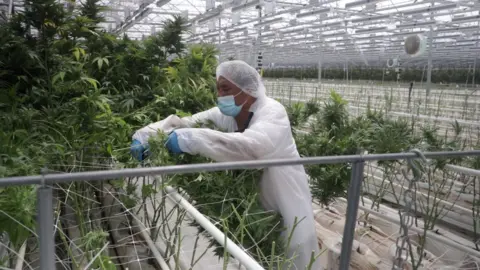
The National Institute for Health and Care Excellence (NICE), which is responsible for deciding what drugs are available on the NHS, says: "Until there is clear evidence of the safety and effectiveness of cannabis-based medicinal products, specialist doctors need to consider individual patient circumstances, clinical condition and need, and to weigh up, with the patient or carer, the relative risks and benefits in choosing treatments."
Additional reporting by Chris Robinson
Follow BBC Sunderland on X, Facebook, Nextdoor and Instagram. Send your story ideas to [email protected].
